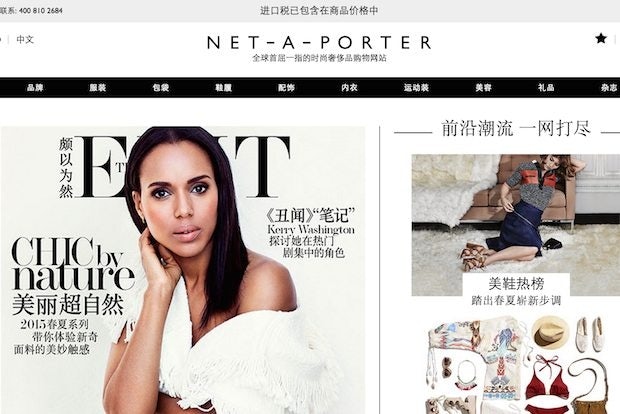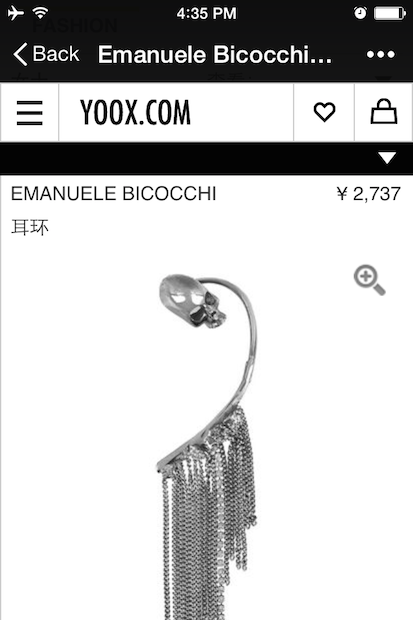
Net-a-Porter's Chinese-language site.
This week, leading luxury conglomerate Richemont announced plans to merge the e-commerce site Net-a-Porter (which Richemont acquired five years ago) with its popular Italian counterpart Yoox. According to Bloomberg, Richemont will own 50 percent of the new “Yoox Net-a-Porter Group,” which will be traded on the Italian stock exchange. After the ink dries, the new combined company plans to raise upwards of 200 million euros ($216 million) to fuel continued global expansion.
As Net-a-Porter founder Natalie Massenet said this week,
Today, we open the doors to the world’s biggest luxury fashion store. It is a store that never closes, a store without geographical borders, a store that connects with, inspires, serves and offers millions of style-conscious global consumers access to the finest designer labels in fashion. A store that provides established and emerging brands with the greatest interactive shop window to the world. Together, with our world-class teams in technology, logistics, content and commerce we are redefining the fashion media and retail landscape. The best way to predict the future of fashion is to create it.
So what does this deal mean for both companies’ efforts in China? Both Yoox and Net-A-Porter have actively targeted China in recent years, to varying levels of success —largely because the market remains highly uneven. To date, Net-a-Porter’s greatest success in the Greater China market has been centered on Hong Kong, where the e-tailer made an early splash two years ago via tram takeovers and a Chinese-language site. Since then, Net-a-Porter’s fortunes in mainland China in particular have been less than stellar, owing to the fact that the market remains far from consolidated, and Net-a-Porter’s pricing and product mix aren’t resonating with the consumer.
Other key brand points that work in Western markets—like elaborate packaging and the glossy “Porter” magazine—matter less than shoppers in China than discounts, and upstart Chinese e-commerce sites have long done their own version of Net-a-Porter’s signature packaging (“inspired” by their Western competitor).
Additionally, the platform lacks even basic things Chinese online shoppers demand, such as UnionPay or Alipay acceptance. So far, buzz around the Net-a-Porter brand in mainland China has remained markedly muted, with its Weibo page showing low engagement rates and few online influencers tapped as brand ambassadors. Posts on the company’s official WeChat account only average 250-500 views apiece (around one-tenth of Burberry’s WeChat engagement rates).

A screenshot from Yoox's WeChat store.
Despite a stronger presence in China, Yoox has not had the easiest time in the market since entering in earnest in 2010 (via a white-labeled Chinese language site for Emporio Armani) and officially launching Yoox.cn in 2012. The Italian e-commerce giant has been a fast mover in the digital space, actively jumping on board the WeChat bandwagon, rolling out a mobile shopping app, and working with bloggers to spread the word. From most accounts, sales have been substantial in the market, with Yoox’s preliminary 2014 earnings report claiming $33 million in revenue in “other countries”—which include China—an increase of 32 percent year-on-year.
Presumably, the new merger should help Net-a-Porter’s prospects in China somewhat more than Yoox’s—but this doesn’t mean a smooth road ahead in the market. China’s vast army of online shoppers is not gravitating towards full-price items as one-time aspirants like Neiman Marcus soon found out after entering the market, and the majority of e-commerce devotees remain fixated on price. Unless Yoox and Net-a-Porter can find ways of not only engaging consumers in China via interesting content and compelling collaborations with designers and bloggers, but pulling them away from daigou sellers, Chinese platforms like Tmall or Xiu.com may continue to benefit the most from China’s e-commerce boom.